MSc Project: Evaluating Software Test Management Tools and Automation
VerifiedAdded on 2023/04/21
|6
|2432
|285
Project
AI Summary
This project proposal outlines a research study focused on evaluating software test management tools and the effects of automation testing. The research begins with a hypothesis comparing the differences in software test management tools and automation testing, aiming to analyze and compare various tools based on performance, reliability, cost, and security. The project's aim is to identify and utilize an appropriate software test management tool, demonstrating the ability to plan and work effectively, while also extending knowledge and critical thinking. Objectives include determining the impacts of automation testing, helping testers choose the right tools, and identifying economic and commercial impacts. The research questions address the merits and demerits of different tools like Instruction Set Simulators and debuggers, comparing their effectiveness and execution times. The project plan involves identifying the problem, assessing the need for change, listing market tools, selecting frontrunners, and implementing a trial phase. The study will use both qualitative and quantitative methods, including literature reviews, to evaluate the chosen tools. The proposal emphasizes the importance of selecting the right tool to improve productivity, team motivation, and product quality.
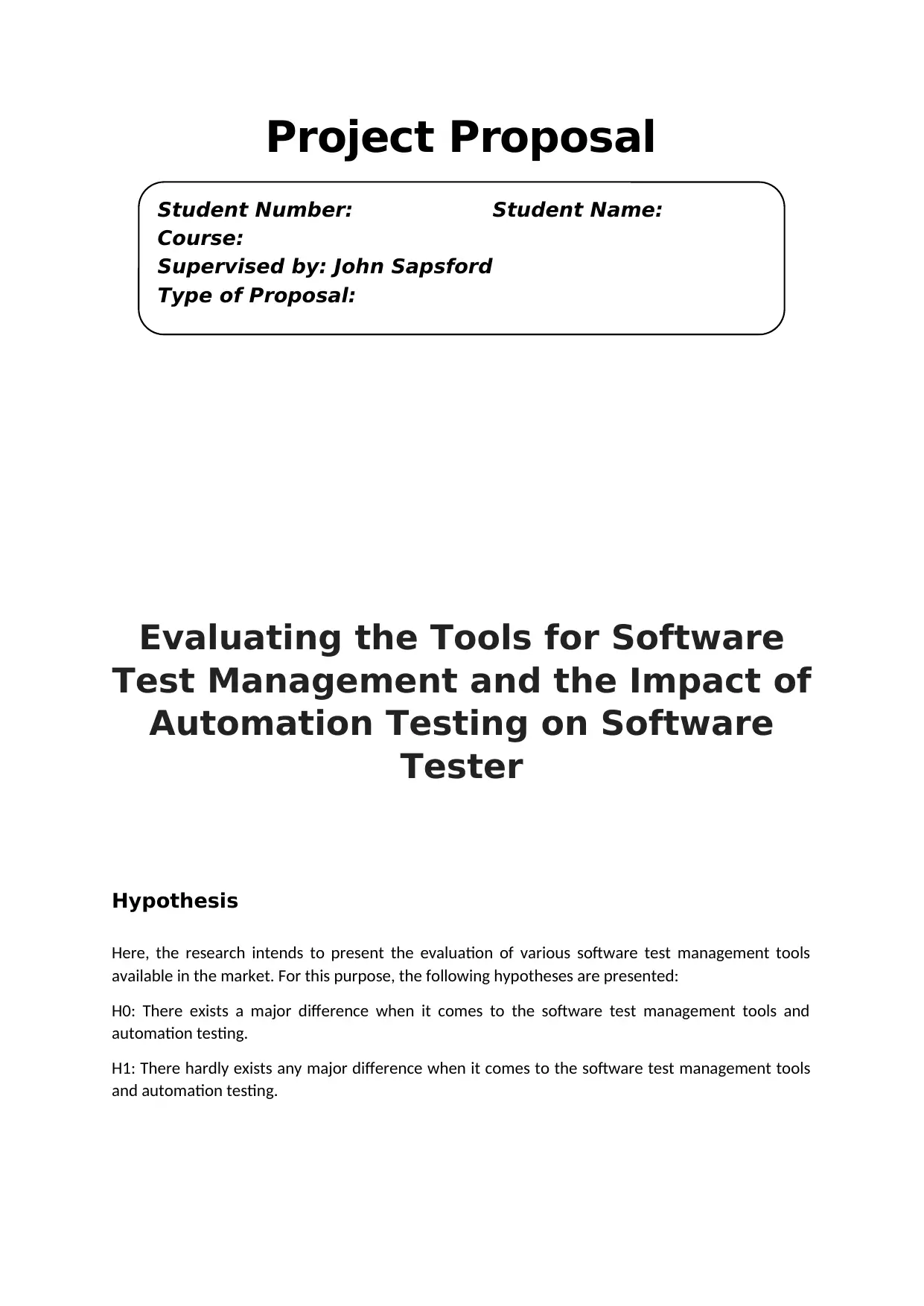
Project Proposal
Evaluating the Tools for Software
Test Management and the Impact of
Automation Testing on Software
Tester
Hypothesis
Here, the research intends to present the evaluation of various software test management tools
available in the market. For this purpose, the following hypotheses are presented:
H0: There exists a major difference when it comes to the software test management tools and
automation testing.
H1: There hardly exists any major difference when it comes to the software test management tools
and automation testing.
Student Number: Student Name:
Course:
Supervised by: John Sapsford
Type of Proposal:
Evaluating the Tools for Software
Test Management and the Impact of
Automation Testing on Software
Tester
Hypothesis
Here, the research intends to present the evaluation of various software test management tools
available in the market. For this purpose, the following hypotheses are presented:
H0: There exists a major difference when it comes to the software test management tools and
automation testing.
H1: There hardly exists any major difference when it comes to the software test management tools
and automation testing.
Student Number: Student Name:
Course:
Supervised by: John Sapsford
Type of Proposal:
Paraphrase This Document
Need a fresh take? Get an instant paraphrase of this document with our AI Paraphraser
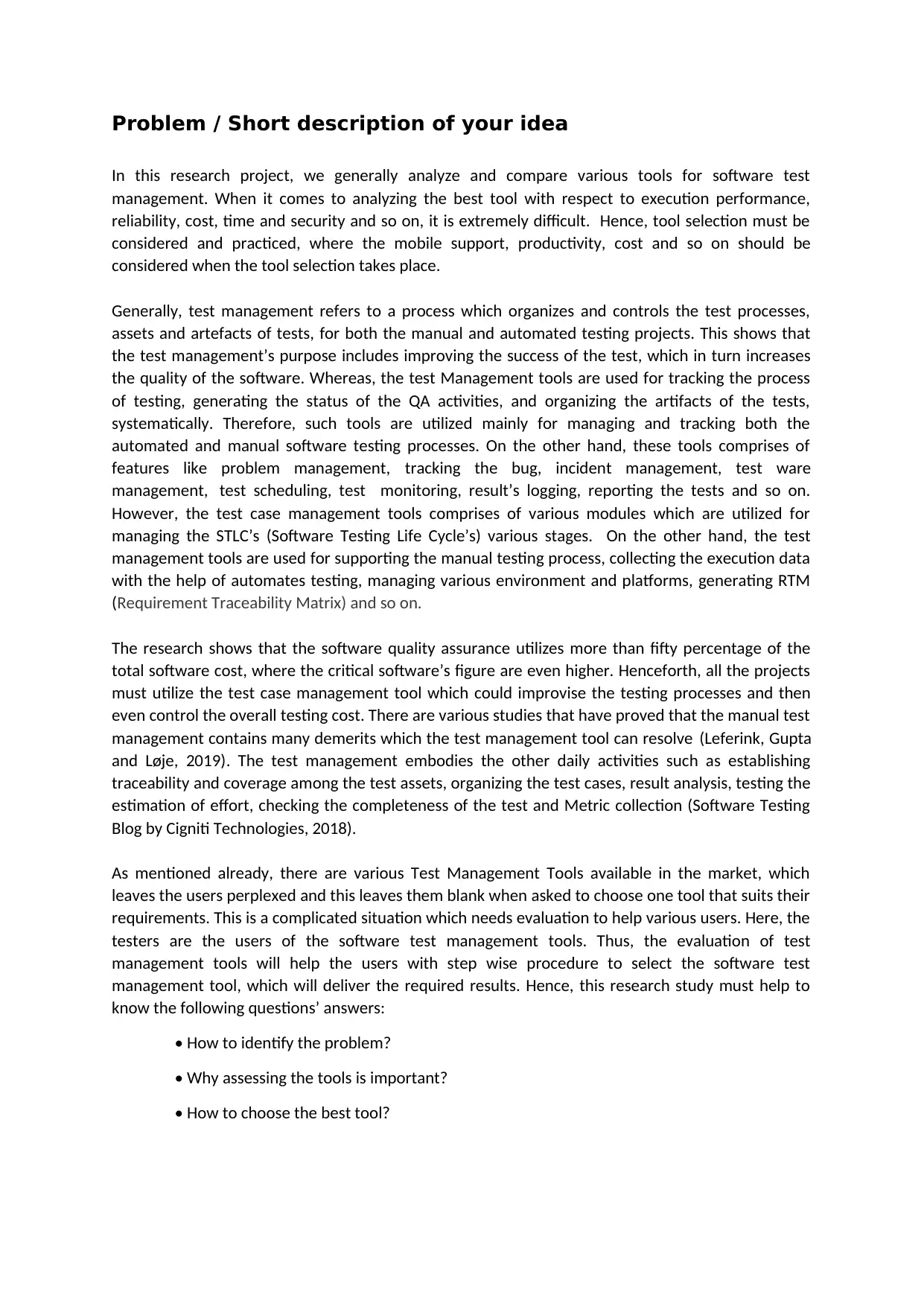
Problem / Short description of your idea
In this research project, we generally analyze and compare various tools for software test
management. When it comes to analyzing the best tool with respect to execution performance,
reliability, cost, time and security and so on, it is extremely difficult. Hence, tool selection must be
considered and practiced, where the mobile support, productivity, cost and so on should be
considered when the tool selection takes place.
Generally, test management refers to a process which organizes and controls the test processes,
assets and artefacts of tests, for both the manual and automated testing projects. This shows that
the test management’s purpose includes improving the success of the test, which in turn increases
the quality of the software. Whereas, the test Management tools are used for tracking the process
of testing, generating the status of the QA activities, and organizing the artifacts of the tests,
systematically. Therefore, such tools are utilized mainly for managing and tracking both the
automated and manual software testing processes. On the other hand, these tools comprises of
features like problem management, tracking the bug, incident management, test ware
management, test scheduling, test monitoring, result’s logging, reporting the tests and so on.
However, the test case management tools comprises of various modules which are utilized for
managing the STLC’s (Software Testing Life Cycle’s) various stages. On the other hand, the test
management tools are used for supporting the manual testing process, collecting the execution data
with the help of automates testing, managing various environment and platforms, generating RTM
(Requirement Traceability Matrix) and so on.
The research shows that the software quality assurance utilizes more than fifty percentage of the
total software cost, where the critical software’s figure are even higher. Henceforth, all the projects
must utilize the test case management tool which could improvise the testing processes and then
even control the overall testing cost. There are various studies that have proved that the manual test
management contains many demerits which the test management tool can resolve (Leferink, Gupta
and Løje, 2019). The test management embodies the other daily activities such as establishing
traceability and coverage among the test assets, organizing the test cases, result analysis, testing the
estimation of effort, checking the completeness of the test and Metric collection (Software Testing
Blog by Cigniti Technologies, 2018).
As mentioned already, there are various Test Management Tools available in the market, which
leaves the users perplexed and this leaves them blank when asked to choose one tool that suits their
requirements. This is a complicated situation which needs evaluation to help various users. Here, the
testers are the users of the software test management tools. Thus, the evaluation of test
management tools will help the users with step wise procedure to select the software test
management tool, which will deliver the required results. Hence, this research study must help to
know the following questions’ answers:
• How to identify the problem?
• Why assessing the tools is important?
• How to choose the best tool?
In this research project, we generally analyze and compare various tools for software test
management. When it comes to analyzing the best tool with respect to execution performance,
reliability, cost, time and security and so on, it is extremely difficult. Hence, tool selection must be
considered and practiced, where the mobile support, productivity, cost and so on should be
considered when the tool selection takes place.
Generally, test management refers to a process which organizes and controls the test processes,
assets and artefacts of tests, for both the manual and automated testing projects. This shows that
the test management’s purpose includes improving the success of the test, which in turn increases
the quality of the software. Whereas, the test Management tools are used for tracking the process
of testing, generating the status of the QA activities, and organizing the artifacts of the tests,
systematically. Therefore, such tools are utilized mainly for managing and tracking both the
automated and manual software testing processes. On the other hand, these tools comprises of
features like problem management, tracking the bug, incident management, test ware
management, test scheduling, test monitoring, result’s logging, reporting the tests and so on.
However, the test case management tools comprises of various modules which are utilized for
managing the STLC’s (Software Testing Life Cycle’s) various stages. On the other hand, the test
management tools are used for supporting the manual testing process, collecting the execution data
with the help of automates testing, managing various environment and platforms, generating RTM
(Requirement Traceability Matrix) and so on.
The research shows that the software quality assurance utilizes more than fifty percentage of the
total software cost, where the critical software’s figure are even higher. Henceforth, all the projects
must utilize the test case management tool which could improvise the testing processes and then
even control the overall testing cost. There are various studies that have proved that the manual test
management contains many demerits which the test management tool can resolve (Leferink, Gupta
and Løje, 2019). The test management embodies the other daily activities such as establishing
traceability and coverage among the test assets, organizing the test cases, result analysis, testing the
estimation of effort, checking the completeness of the test and Metric collection (Software Testing
Blog by Cigniti Technologies, 2018).
As mentioned already, there are various Test Management Tools available in the market, which
leaves the users perplexed and this leaves them blank when asked to choose one tool that suits their
requirements. This is a complicated situation which needs evaluation to help various users. Here, the
testers are the users of the software test management tools. Thus, the evaluation of test
management tools will help the users with step wise procedure to select the software test
management tool, which will deliver the required results. Hence, this research study must help to
know the following questions’ answers:
• How to identify the problem?
• Why assessing the tools is important?
• How to choose the best tool?
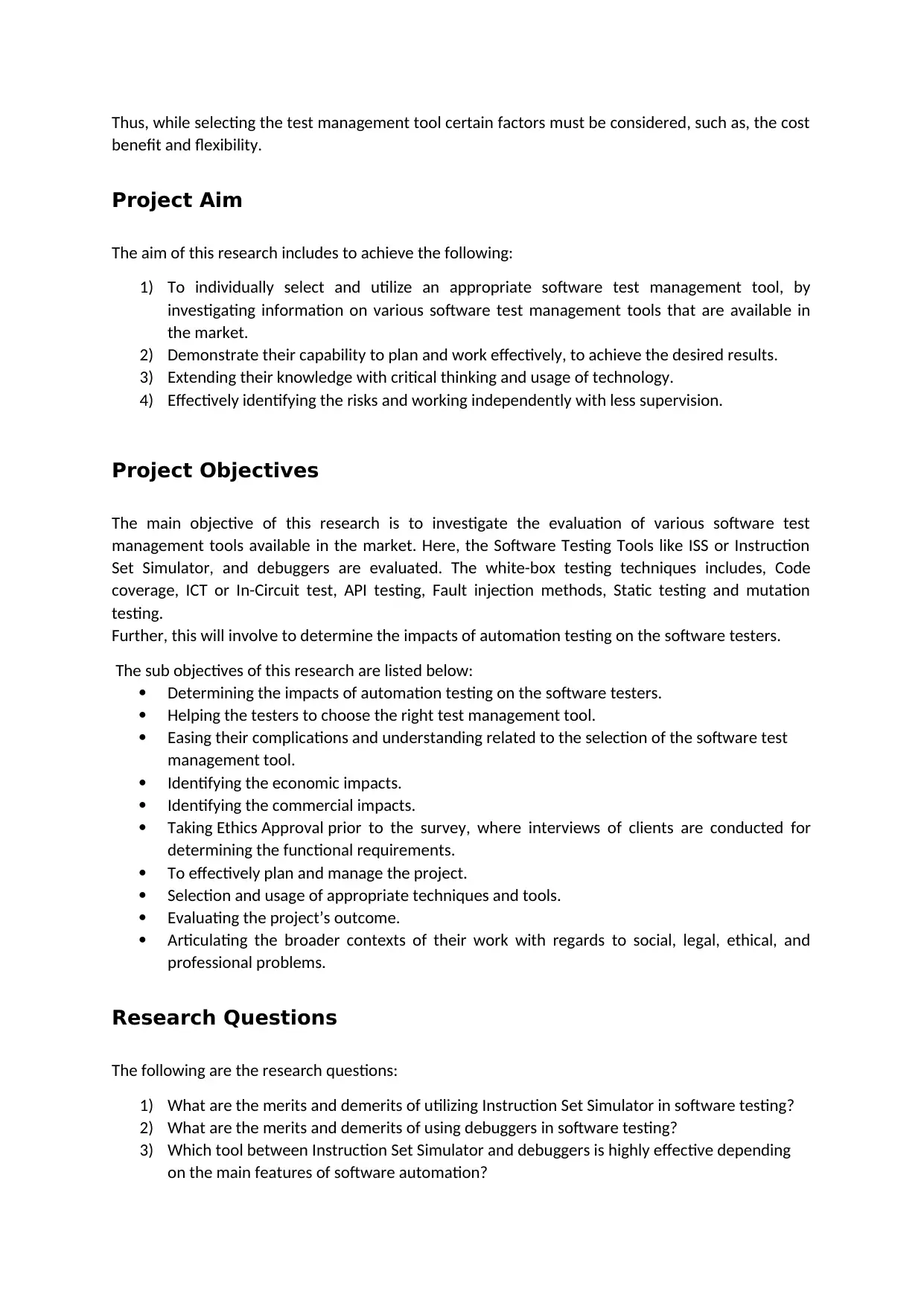
Thus, while selecting the test management tool certain factors must be considered, such as, the cost
benefit and flexibility.
Project Aim
The aim of this research includes to achieve the following:
1) To individually select and utilize an appropriate software test management tool, by
investigating information on various software test management tools that are available in
the market.
2) Demonstrate their capability to plan and work effectively, to achieve the desired results.
3) Extending their knowledge with critical thinking and usage of technology.
4) Effectively identifying the risks and working independently with less supervision.
Project Objectives
The main objective of this research is to investigate the evaluation of various software test
management tools available in the market. Here, the Software Testing Tools like ISS or Instruction
Set Simulator, and debuggers are evaluated. The white-box testing techniques includes, Code
coverage, ICT or In-Circuit test, API testing, Fault injection methods, Static testing and mutation
testing.
Further, this will involve to determine the impacts of automation testing on the software testers.
The sub objectives of this research are listed below:
Determining the impacts of automation testing on the software testers.
Helping the testers to choose the right test management tool.
Easing their complications and understanding related to the selection of the software test
management tool.
Identifying the economic impacts.
Identifying the commercial impacts.
Taking Ethics Approval prior to the survey, where interviews of clients are conducted for
determining the functional requirements.
To effectively plan and manage the project.
Selection and usage of appropriate techniques and tools.
Evaluating the project’s outcome.
Articulating the broader contexts of their work with regards to social, legal, ethical, and
professional problems.
Research Questions
The following are the research questions:
1) What are the merits and demerits of utilizing Instruction Set Simulator in software testing?
2) What are the merits and demerits of using debuggers in software testing?
3) Which tool between Instruction Set Simulator and debuggers is highly effective depending
on the main features of software automation?
benefit and flexibility.
Project Aim
The aim of this research includes to achieve the following:
1) To individually select and utilize an appropriate software test management tool, by
investigating information on various software test management tools that are available in
the market.
2) Demonstrate their capability to plan and work effectively, to achieve the desired results.
3) Extending their knowledge with critical thinking and usage of technology.
4) Effectively identifying the risks and working independently with less supervision.
Project Objectives
The main objective of this research is to investigate the evaluation of various software test
management tools available in the market. Here, the Software Testing Tools like ISS or Instruction
Set Simulator, and debuggers are evaluated. The white-box testing techniques includes, Code
coverage, ICT or In-Circuit test, API testing, Fault injection methods, Static testing and mutation
testing.
Further, this will involve to determine the impacts of automation testing on the software testers.
The sub objectives of this research are listed below:
Determining the impacts of automation testing on the software testers.
Helping the testers to choose the right test management tool.
Easing their complications and understanding related to the selection of the software test
management tool.
Identifying the economic impacts.
Identifying the commercial impacts.
Taking Ethics Approval prior to the survey, where interviews of clients are conducted for
determining the functional requirements.
To effectively plan and manage the project.
Selection and usage of appropriate techniques and tools.
Evaluating the project’s outcome.
Articulating the broader contexts of their work with regards to social, legal, ethical, and
professional problems.
Research Questions
The following are the research questions:
1) What are the merits and demerits of utilizing Instruction Set Simulator in software testing?
2) What are the merits and demerits of using debuggers in software testing?
3) Which tool between Instruction Set Simulator and debuggers is highly effective depending
on the main features of software automation?
⊘ This is a preview!⊘
Do you want full access?
Subscribe today to unlock all pages.

Trusted by 1+ million students worldwide
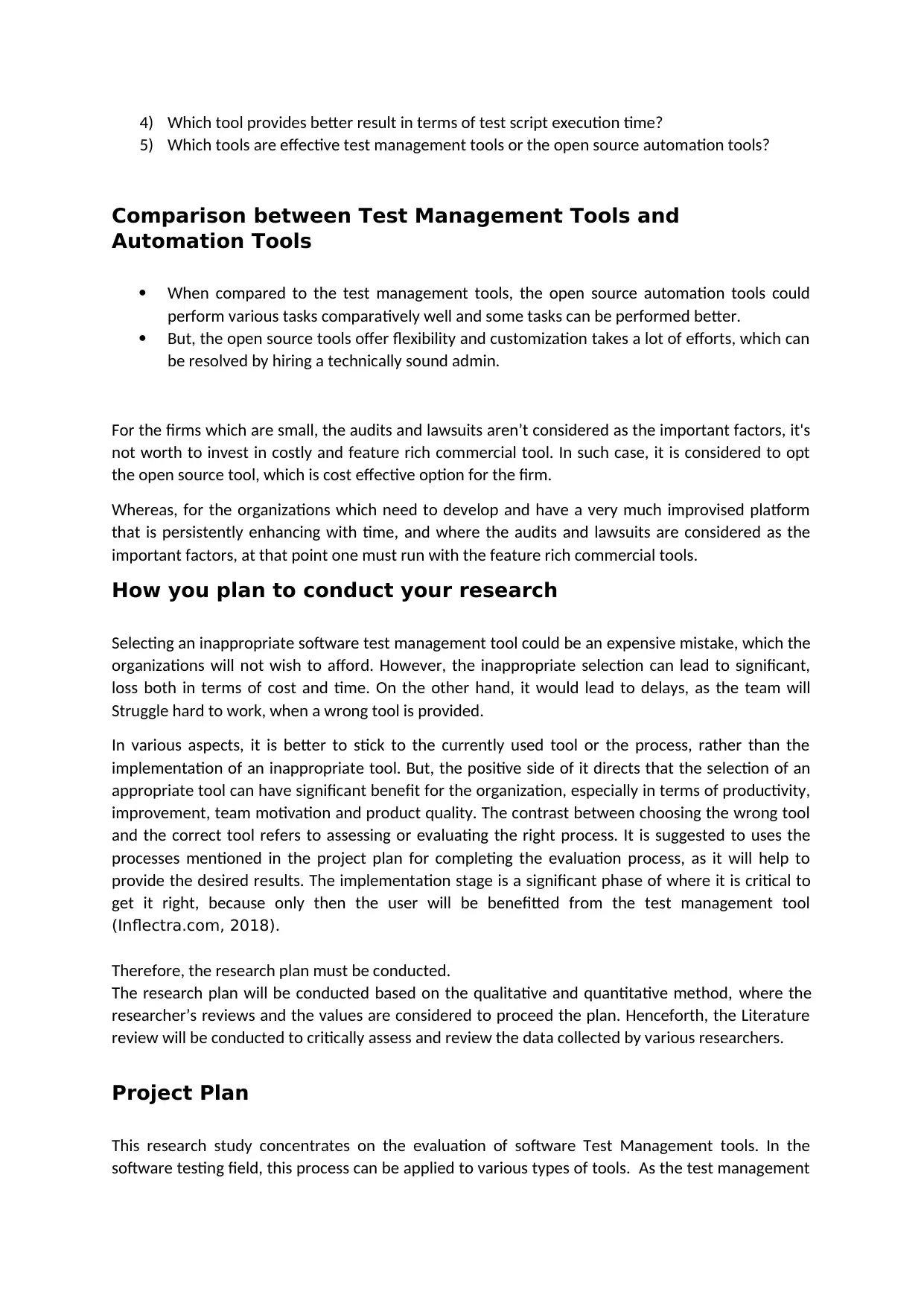
4) Which tool provides better result in terms of test script execution time?
5) Which tools are effective test management tools or the open source automation tools?
Comparison between Test Management Tools and
Automation Tools
When compared to the test management tools, the open source automation tools could
perform various tasks comparatively well and some tasks can be performed better.
But, the open source tools offer flexibility and customization takes a lot of efforts, which can
be resolved by hiring a technically sound admin.
For the firms which are small, the audits and lawsuits aren’t considered as the important factors, it's
not worth to invest in costly and feature rich commercial tool. In such case, it is considered to opt
the open source tool, which is cost effective option for the firm.
Whereas, for the organizations which need to develop and have a very much improvised platform
that is persistently enhancing with time, and where the audits and lawsuits are considered as the
important factors, at that point one must run with the feature rich commercial tools.
How you plan to conduct your research
Selecting an inappropriate software test management tool could be an expensive mistake, which the
organizations will not wish to afford. However, the inappropriate selection can lead to significant,
loss both in terms of cost and time. On the other hand, it would lead to delays, as the team will
Struggle hard to work, when a wrong tool is provided.
In various aspects, it is better to stick to the currently used tool or the process, rather than the
implementation of an inappropriate tool. But, the positive side of it directs that the selection of an
appropriate tool can have significant benefit for the organization, especially in terms of productivity,
improvement, team motivation and product quality. The contrast between choosing the wrong tool
and the correct tool refers to assessing or evaluating the right process. It is suggested to uses the
processes mentioned in the project plan for completing the evaluation process, as it will help to
provide the desired results. The implementation stage is a significant phase of where it is critical to
get it right, because only then the user will be benefitted from the test management tool
(Inflectra.com, 2018).
Therefore, the research plan must be conducted.
The research plan will be conducted based on the qualitative and quantitative method, where the
researcher’s reviews and the values are considered to proceed the plan. Henceforth, the Literature
review will be conducted to critically assess and review the data collected by various researchers.
Project Plan
This research study concentrates on the evaluation of software Test Management tools. In the
software testing field, this process can be applied to various types of tools. As the test management
5) Which tools are effective test management tools or the open source automation tools?
Comparison between Test Management Tools and
Automation Tools
When compared to the test management tools, the open source automation tools could
perform various tasks comparatively well and some tasks can be performed better.
But, the open source tools offer flexibility and customization takes a lot of efforts, which can
be resolved by hiring a technically sound admin.
For the firms which are small, the audits and lawsuits aren’t considered as the important factors, it's
not worth to invest in costly and feature rich commercial tool. In such case, it is considered to opt
the open source tool, which is cost effective option for the firm.
Whereas, for the organizations which need to develop and have a very much improvised platform
that is persistently enhancing with time, and where the audits and lawsuits are considered as the
important factors, at that point one must run with the feature rich commercial tools.
How you plan to conduct your research
Selecting an inappropriate software test management tool could be an expensive mistake, which the
organizations will not wish to afford. However, the inappropriate selection can lead to significant,
loss both in terms of cost and time. On the other hand, it would lead to delays, as the team will
Struggle hard to work, when a wrong tool is provided.
In various aspects, it is better to stick to the currently used tool or the process, rather than the
implementation of an inappropriate tool. But, the positive side of it directs that the selection of an
appropriate tool can have significant benefit for the organization, especially in terms of productivity,
improvement, team motivation and product quality. The contrast between choosing the wrong tool
and the correct tool refers to assessing or evaluating the right process. It is suggested to uses the
processes mentioned in the project plan for completing the evaluation process, as it will help to
provide the desired results. The implementation stage is a significant phase of where it is critical to
get it right, because only then the user will be benefitted from the test management tool
(Inflectra.com, 2018).
Therefore, the research plan must be conducted.
The research plan will be conducted based on the qualitative and quantitative method, where the
researcher’s reviews and the values are considered to proceed the plan. Henceforth, the Literature
review will be conducted to critically assess and review the data collected by various researchers.
Project Plan
This research study concentrates on the evaluation of software Test Management tools. In the
software testing field, this process can be applied to various types of tools. As the test management
Paraphrase This Document
Need a fresh take? Get an instant paraphrase of this document with our AI Paraphraser
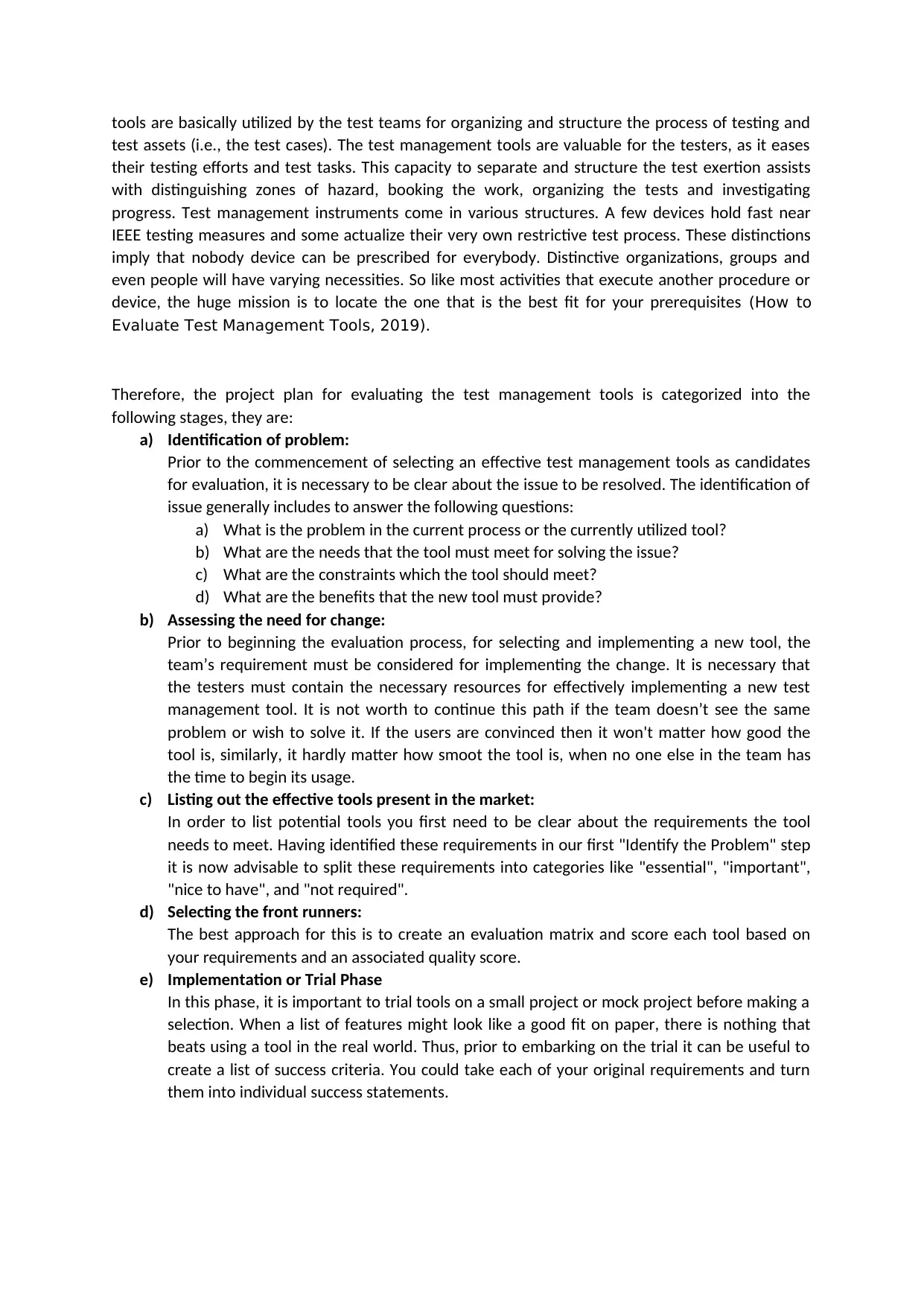
tools are basically utilized by the test teams for organizing and structure the process of testing and
test assets (i.e., the test cases). The test management tools are valuable for the testers, as it eases
their testing efforts and test tasks. This capacity to separate and structure the test exertion assists
with distinguishing zones of hazard, booking the work, organizing the tests and investigating
progress. Test management instruments come in various structures. A few devices hold fast near
IEEE testing measures and some actualize their very own restrictive test process. These distinctions
imply that nobody device can be prescribed for everybody. Distinctive organizations, groups and
even people will have varying necessities. So like most activities that execute another procedure or
device, the huge mission is to locate the one that is the best fit for your prerequisites (How to
Evaluate Test Management Tools, 2019).
Therefore, the project plan for evaluating the test management tools is categorized into the
following stages, they are:
a) Identification of problem:
Prior to the commencement of selecting an effective test management tools as candidates
for evaluation, it is necessary to be clear about the issue to be resolved. The identification of
issue generally includes to answer the following questions:
a) What is the problem in the current process or the currently utilized tool?
b) What are the needs that the tool must meet for solving the issue?
c) What are the constraints which the tool should meet?
d) What are the benefits that the new tool must provide?
b) Assessing the need for change:
Prior to beginning the evaluation process, for selecting and implementing a new tool, the
team’s requirement must be considered for implementing the change. It is necessary that
the testers must contain the necessary resources for effectively implementing a new test
management tool. It is not worth to continue this path if the team doesn’t see the same
problem or wish to solve it. If the users are convinced then it won't matter how good the
tool is, similarly, it hardly matter how smoot the tool is, when no one else in the team has
the time to begin its usage.
c) Listing out the effective tools present in the market:
In order to list potential tools you first need to be clear about the requirements the tool
needs to meet. Having identified these requirements in our first "Identify the Problem" step
it is now advisable to split these requirements into categories like "essential", "important",
"nice to have", and "not required".
d) Selecting the front runners:
The best approach for this is to create an evaluation matrix and score each tool based on
your requirements and an associated quality score.
e) Implementation or Trial Phase
In this phase, it is important to trial tools on a small project or mock project before making a
selection. When a list of features might look like a good fit on paper, there is nothing that
beats using a tool in the real world. Thus, prior to embarking on the trial it can be useful to
create a list of success criteria. You could take each of your original requirements and turn
them into individual success statements.
test assets (i.e., the test cases). The test management tools are valuable for the testers, as it eases
their testing efforts and test tasks. This capacity to separate and structure the test exertion assists
with distinguishing zones of hazard, booking the work, organizing the tests and investigating
progress. Test management instruments come in various structures. A few devices hold fast near
IEEE testing measures and some actualize their very own restrictive test process. These distinctions
imply that nobody device can be prescribed for everybody. Distinctive organizations, groups and
even people will have varying necessities. So like most activities that execute another procedure or
device, the huge mission is to locate the one that is the best fit for your prerequisites (How to
Evaluate Test Management Tools, 2019).
Therefore, the project plan for evaluating the test management tools is categorized into the
following stages, they are:
a) Identification of problem:
Prior to the commencement of selecting an effective test management tools as candidates
for evaluation, it is necessary to be clear about the issue to be resolved. The identification of
issue generally includes to answer the following questions:
a) What is the problem in the current process or the currently utilized tool?
b) What are the needs that the tool must meet for solving the issue?
c) What are the constraints which the tool should meet?
d) What are the benefits that the new tool must provide?
b) Assessing the need for change:
Prior to beginning the evaluation process, for selecting and implementing a new tool, the
team’s requirement must be considered for implementing the change. It is necessary that
the testers must contain the necessary resources for effectively implementing a new test
management tool. It is not worth to continue this path if the team doesn’t see the same
problem or wish to solve it. If the users are convinced then it won't matter how good the
tool is, similarly, it hardly matter how smoot the tool is, when no one else in the team has
the time to begin its usage.
c) Listing out the effective tools present in the market:
In order to list potential tools you first need to be clear about the requirements the tool
needs to meet. Having identified these requirements in our first "Identify the Problem" step
it is now advisable to split these requirements into categories like "essential", "important",
"nice to have", and "not required".
d) Selecting the front runners:
The best approach for this is to create an evaluation matrix and score each tool based on
your requirements and an associated quality score.
e) Implementation or Trial Phase
In this phase, it is important to trial tools on a small project or mock project before making a
selection. When a list of features might look like a good fit on paper, there is nothing that
beats using a tool in the real world. Thus, prior to embarking on the trial it can be useful to
create a list of success criteria. You could take each of your original requirements and turn
them into individual success statements.
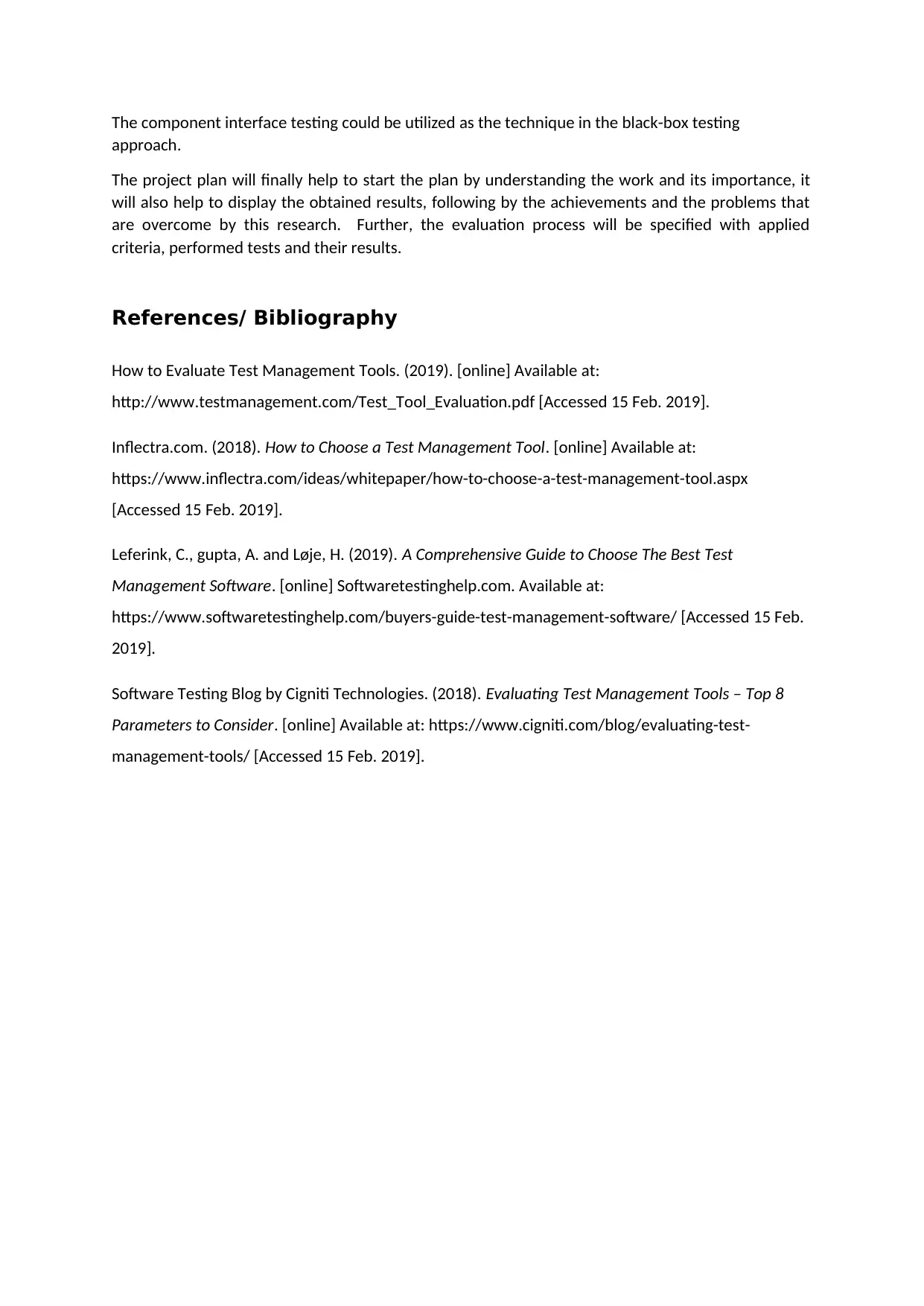
The component interface testing could be utilized as the technique in the black-box testing
approach.
The project plan will finally help to start the plan by understanding the work and its importance, it
will also help to display the obtained results, following by the achievements and the problems that
are overcome by this research. Further, the evaluation process will be specified with applied
criteria, performed tests and their results.
References/ Bibliography
How to Evaluate Test Management Tools. (2019). [online] Available at:
http://www.testmanagement.com/Test_Tool_Evaluation.pdf [Accessed 15 Feb. 2019].
Inflectra.com. (2018). How to Choose a Test Management Tool. [online] Available at:
https://www.inflectra.com/ideas/whitepaper/how-to-choose-a-test-management-tool.aspx
[Accessed 15 Feb. 2019].
Leferink, C., gupta, A. and Løje, H. (2019). A Comprehensive Guide to Choose The Best Test
Management Software. [online] Softwaretestinghelp.com. Available at:
https://www.softwaretestinghelp.com/buyers-guide-test-management-software/ [Accessed 15 Feb.
2019].
Software Testing Blog by Cigniti Technologies. (2018). Evaluating Test Management Tools – Top 8
Parameters to Consider. [online] Available at: https://www.cigniti.com/blog/evaluating-test-
management-tools/ [Accessed 15 Feb. 2019].
approach.
The project plan will finally help to start the plan by understanding the work and its importance, it
will also help to display the obtained results, following by the achievements and the problems that
are overcome by this research. Further, the evaluation process will be specified with applied
criteria, performed tests and their results.
References/ Bibliography
How to Evaluate Test Management Tools. (2019). [online] Available at:
http://www.testmanagement.com/Test_Tool_Evaluation.pdf [Accessed 15 Feb. 2019].
Inflectra.com. (2018). How to Choose a Test Management Tool. [online] Available at:
https://www.inflectra.com/ideas/whitepaper/how-to-choose-a-test-management-tool.aspx
[Accessed 15 Feb. 2019].
Leferink, C., gupta, A. and Løje, H. (2019). A Comprehensive Guide to Choose The Best Test
Management Software. [online] Softwaretestinghelp.com. Available at:
https://www.softwaretestinghelp.com/buyers-guide-test-management-software/ [Accessed 15 Feb.
2019].
Software Testing Blog by Cigniti Technologies. (2018). Evaluating Test Management Tools – Top 8
Parameters to Consider. [online] Available at: https://www.cigniti.com/blog/evaluating-test-
management-tools/ [Accessed 15 Feb. 2019].
⊘ This is a preview!⊘
Do you want full access?
Subscribe today to unlock all pages.

Trusted by 1+ million students worldwide
1 out of 6
Related Documents
Your All-in-One AI-Powered Toolkit for Academic Success.
+13062052269
info@desklib.com
Available 24*7 on WhatsApp / Email
![[object Object]](/_next/static/media/star-bottom.7253800d.svg)
Unlock your academic potential
Copyright © 2020–2026 A2Z Services. All Rights Reserved. Developed and managed by ZUCOL.




